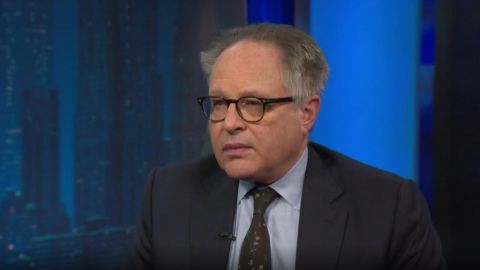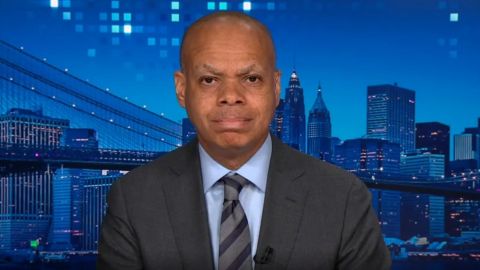Read Transcript EXPAND
CHRISTIANE AMANPOUR: Veteran journalist and author, Nicholas Lemann offers his own take on his latest book “Transaction Man: The rise of the deal and the decline of the American Dream.” Power, he says has shifted away from government and corporations towards the financial sector. And as our Walter Isaacson discovers, the book centers on three key people.
WALTER ISAACSON, PRESIDENT OF THE ASPEN INSTITUTE: I guess, I should say at the outset, you and I grew up together. I’ve been a fan of yours for about 50 to 60 years, and especially your new book, “Transaction Man.” In your book, you talk about a period of American life through much of the 20th Century that there was some economic security that came from big corporations and General Motors and the fact that you’ve got a good job at a good wage and then a pension. Explain how that happened and how it declined.
LEMANN: Okay. So it’s an interesting story. Well, let’s stipulate first, there was a pretty big part of the population that worked for big corporations in the glory days of, you know, American hegemony after the Second World War. And you know, when big industrial corporations really weren’t big. Let’s stipulate, not everybody was cut in on the deal. And you know, you’re talking about a heavy white male phenomenon. And that meant that, among other things, it wasn’t a very stable social order. But it didn’t always exist. It was created out of the New Deal in the Second World War. Before then, it didn’t exist and corporations were quite new and corporations were forced to and/or decided to become kind of the welfare state that we didn’t have in the U.S. — in government would have in the private sector.
LEMANN: So for a lot of Americans, things like job security, pensions after you retired, health benefits, annual raises for inflation, unions came through your corporate employer. By the way, it’s kind of you know, my book is called “Transaction Man.” That’s a play on a book called “The Organization Man” by William Whyte in 1958. Now, when you look at that book, and there’s a whole shelf of books like that, you still have to laugh because you think okay, you know, this is bitter complaint about the problems with America. The problems are, damn it, everybody — I mean —
ISAACSON: Too much conformity with what they could blame about.
LEMANN: Yes, I mean, you used to work for Time, Inc., so you can relate to this from your own experience. You know, it was, we’ve got to do something about this situation where everybody has a secure job, and they work nine to five, and they can support a whole family and they can send their kids to college. They can be confident their kids will do better than them. I mean, this is crushing the American spirit. So that’s what a lot of these liberal social critics, back then, but it went away very dramatically. And the fact that it went away, I think created a lot of the mood in the United States that you’re seeing now.
ISAACSON: So let’s bring this down to a specific girth which is, I think Chicago lawn in your years and a guy who owns a Buick dealership, and you know, in the 50s, 60s and 70s, there’s nothing better you can be than sort of having a GM dealer and all the auto suppliers and the companies and everybody worked. And this is going fine in Chicago lawn, right?
LEMANN: Well, okay, so everything looks better in retrospect. The guy that you’re talking about is a character in the book named Nick D’Andrea, who is, you know, if he is not a Trump voter, certainly when I was hanging around with him a lot while working on the book, I met a lot of Trump voters. And these are, you know, blue-collar people who didn’t go to college and made it into the middle class through avenues that don’t exist so much anymore. So this guy, you know, started out as an auto — he actually started out running a food cart, and then became an auto salesman, a used car salesman. A used car salesman finally acquired a majority of a dealership in a kind of tough blue-collar neighborhood that was transitioning from white to black and Latino. So it wasn’t like the location every auto dealer wanted, but he’s a gutsy guy, and he hung on and he was making it work. And then, right when GM was going bankrupt, as part of that, a whole bunch of auto dealers were put out of business. And he got a letter in the mail one day saying, sorry, you’re out of business, you’re not an auto dealer anymore.
ISAACSON: Well, let me stick up for him for a second because we did the bailout of the banks then — all OF the financial. We did the bailout of the auto industry back then.
LEMANN: Right.
ISAACSON: But the poor guy who has the Buick dealership in the suburb of Chicago, he loses everything.
LEMANN: Yes. And I would add to that, there’s another version that you see or that I saw in the same neighborhood, which is the mortgage holders also didn’t get taken care of or the people who took out mortgages didn’t get taken care of nearly the same way than the people who issued the mortgages did. And you know, the argument, we have to preserve the financial system from collapse and so on, but boy in that neighborhood, it is vivid because you know, when I was doing reporting there, you just empty houses everywhere. It’s just such a struggle to keep that neighborhood going. You know, there’s a really palpable feeling in that neighborhood that whoever is running the country and the financial system just doesn’t care about us and they take care of their friends and they don’t take care of us. And that leads to a lot of sort of anger and a kind of almost desperate feeling. It’s really striking when you’re there.
ISAACSON: What’s very vivid on the ground in your book, among people who once depended on the General Motors Corporation supply chain and everything else, jobs got shipped overseas, trade didn’t help them. Immigration didn’t help them. And a growing economy didn’t help them.
LEMANN: Yes. And you and the other thing that you see in that neighborhood and a lot of neighborhoods is just, you know, there’ll be these big employers and you look at the big employers and either they disappear, or they’re on their eighth owner in the last 20 years. There’s just – there’s a tremendous amount of, you know, breaking apart and reassembling of the large units of the American economy that leaves people feel very confused.
LEMANN: You know, as people give account of what has led to the current discontent, this is a big part of it that hasn’t been in people’s standard picture. You know, people talk about a whole bunch of different factors. You know, the left has one set, the right has another set, but I don’t think people appreciate how important this change in the economy has been in changing the mood of the country, particularly that this kind of shift from institutional corporate kind of orientation to a very fluid financial orientation.
ISAACSON: The real villain though in your book in terms of the hollowing out of this working middle class, it’s not totally government but Wall Street and the transaction folks.
LEMANN: Yes, I would say not even just Wall Street, but a kind of way of thinking. And I want to say, you know, I don’t know if this is actually true, but supposedly Flaubert said “Madame Bovary” c’est moi.
ISAACSON: Yes.
LEMANN: And I would say, “Transaction Man” c’est moi. I mean, I don’t know how you would react to this. But when I was young and coming up in the world, I was very enthusiastic as a young liberal journalist about a lot of stuff that I now think of is a terrible mistake. So I don’t think it was just greedy, evil guys from Wall Street, I think it was bipartisan enthusiasm by sort of elite liberals on both coasts for a different kind of vision of society. You know, people who had read “The Organization Man” and were really convinced by it and didn’t think we’ll miss this one day and again, I’m in that category, I thought wouldn’t it be great if we can have a more fluid society in which we can break up some of these big institutions that are standing in the way of progress and creativity, and we’ll have a much more sort of fluid world. So I think out of that fundamental attitude came a lot of specific things in many realms, including Wall Street, but it should be understood in that larger context. Wall Street became so much bigger because they went from being one of the most regulated industries in the country, really tightly regulated, coming out of the New Deal, and even the 19th Century to substantially deregulated and that was very bipartisan, that wasn’t just, you know, Wall Street runs the country. It wasn’t a corporate plot. It wasn’t a conservative plot. It was a bipartisan consensus that this was going to work out really well for everybody.
ISAACSON: In 1997, the Business Roundtable, is it? It sort of says, shareholder value has to be supreme. That’s all a company or a corporation should focus on — it is returning shareholder value. This is, of course, different than the corporate world that you write about at the beginning of the rise of corporate America. Well, they cared about the community, they cared about the workers, they cared about the shareholders, stakeholders, everything else. That seems to be an inflection point in ’97.
LEMANN: The sort of great theorist of the shareholder revolution is an economist named, Michael Jensen, who is much featured in the book and who wrote a very influential article in 1976. This is one of the most cited academic publications of all time saying, you know, corporations, this age, you were talking about must end and corporations must reorient themselves toward their shareholders. So 20 years, you know, of a lot of activity this had become conventional wisdom. If you remember the poster child of CEO then was Jack Welch of GE, who had really embraced this. And by the way, had decided GE, which was the classic Organization Man company, no longer would have de facto lifetime tenure for everybody and, you know, retire at 65 with your defined benefit pension. And so that was what everybody thought in 1997. And that was why the Business Roundtable issued the statement. Now, just in August, they reversed themselves. So that’s really interesting. And they issued a new statement, signed by 180 CEOs organized by Jamie Dimon of JPMorgan Chase saying, nope, we changed our mind. They didn’t say that way. And now we embrace something like the old vision of the corporation, the socially responsible corporation that attends to the interests of many stakeholders and the public and so on and not just shareholders. So that’s interesting.
ISAACSON: Do you think that’s going to work and it will have an impact?
LEMANN: Some but not a huge impact would be my guess. And the reason is a couple things; one, you know, legally, they have to listen to their shareholders. So if even Jamie Dimon stops listening to his shareholders, somebody is going to sue, you know, and say, wait a minute, you know, you’re taking our money away to attend to some social cause.
ISAACSON: But didn’t the law used to allow — the Delaware court and others — to balance shareholder value with other things, and that changed.
LEMANN: It changed, partly in less, my impression is out of legal changes than of practice changes. In those older days, you didn’t have a very aggressive set of lawyers who were sort of making the shareholder revolution happen lawsuit by lawsuit.
ISAACSON: Well, the big corporations you wrote about in the main part of your book, that General Motors or the GEs or the IBMs that looked after the workers have now been replaced in some ways, both in the economy and in our mindset with these big tech companies.
LEMANN: Yes. Right.
ISAACSON: And so how are they going to react to this?
LEMANN: Well, they did sign the statement. Okay. So things are changing and it’s an interesting moment, because it’s — I don’t know if maybe you would be willing to put a date on it, but up to X year — 2015, 2012 — something like that, you almost could never read anything that said, there’s a problem with big tech companies and we were really in awe of Google and Facebook and Apple and so on. In the same way that in the late 19th Century, people were in awe of the railroad companies and people like that and it has shifted very quickly.
ISAACSON: Why has there been a backlash against big tech?
LEMANN: I think it’s partly the tenor of the times that we’ve been talking about that the economic populism, which really wasn’t part of front line American politics has come back to the fore. It is presenting itself in this presidential campaign more than in a lot that I can remember in the recent past, and they’re an obvious target. So that’s one thing. Another thing is, I think people are realizing that, you know, there’s a downside to the big tech companies, they’re not human saints, they’re collecting a lot of data on us. For us journalists, you know, we’ve watched the newspaper business kind of decline tremendously and the magazine business, too. So there’s a more sort of nuanced sense that you know, when something very big happens very fast, it’s not a hundred percent positive.
ISAACSON: Let’s look at the big picture though. We’ve had about a decade of good economic growth. We have low unemployment. We have a pretty robust economy. Globally, the economy has been doing pretty well. And yet, more and more people rightly feel that they don’t have job security, that their kids aren’t going to have it better than they are, that they’re not going to be able to get great educations for their kids and not be able to afford it. So it makes sense that there’s this discontent with the deal that we were given that when we all play by the rules, it was going to be better.
LEMANN: Yes, I agree with that completely. You know, this is another thing where I don’t want to put all the blame on conservatives, but also on us, liberals is, you know, I think, at least the younger version of me thought, if you can get sort of the macroeconomic policy right, you know, tax policy and so on, that will solve problems. And I personally tended to be very suspicious of anything that attempted to, you know, preserve existing economic arrangements, existing economic institutions, the locations where people lived — anything like that I thought couldn’t possibly work and would be bad. And that attitude which is pretty widespread doesn’t track with the problems you’re talking about, because that’s how you can get to a good — you know, objectively, a good economy that goes along with a tremendous amount of discontent. And, by the way, embedded in what we’re both saying, I don’t think it’s — the discontent is just manufactured by Fox News or whomever. I think it’s real. And, you know, politicians have to realize that it’s there and think about how to deal with it and they’re starting to and that’s a good thing.
ISAACSON: Nick, thanks for being with us.
LEMANN: Thank you.
About This Episode EXPAND
As House Democrats kick off this week with more congressional evidence, Patrick Gaspard joins the program to discuss the impeachment hearings. Bernardine Evaristo, the first black woman to win the prestigious Booker Prize, tells Christiane about her novel “Girl, Woman, Other.” Nicholas Lemann sits down with Walter Isaacson to offer his take on the ideal of the American Dream.
LEARN MORE


